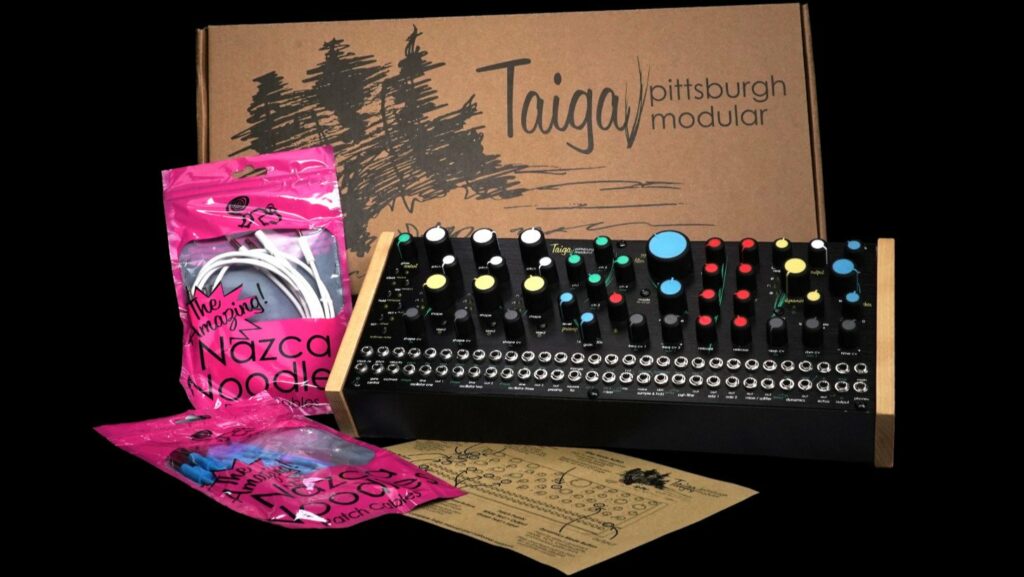Combining classic synth design with modern ideas, Pittsburgh’s latest instrument turns out to be a powerhouse with a unique flavour. Greg Scarth finds out what it has to offer.

You’d be forgiven for thinking there aren’t many more unexplored approaches to analogue synth design, but Pennsylvania’s Pittsburgh Modular would beg to differ. Across their Eurorack modules, recent collaborations with Cre8audio and their larger instruments like the Lifeforms SV-1. The new Pittsburgh Modular Taiga is a synth which reflects the brand’s creative approach, appearing to be a fairly straightforward semi-modular analogue design but hiding a wealth of unique features, from versatile oscillators and filter to West Coast-inspired dynamics. Compact and powerful, the Taiga aims to hit a sweet spot of sound, size and affordability, coming in at just over £700.
Pulling it out of the box and diving straight in, the Taiga instantly looks like very good value. With three VCOs, two envelope generators, an extremely capable multi-mode filter and Pittsburgh’s unique dynamics controller, it’s a synth designed to be versatile and expandable as well as powerful in isolation. It’s a serious instrument, a step above (very good) semi-modular synths like the Make Noise 0-Coast and PWM Malevolent and into the rarefied territory occupied by instruments like the Moog Mother-32 and AnalogFX SER-2020.
There’s nothing particularly unusual about an internally patched semi-modular synth, but Pittsburgh Modular seem keen to point out that the Taiga is the equivalent of 15 separate modules hidden behind one shared front panel. Perhaps that’s to emphasise the creative possibilities here, but the internal patching means you don’t need to draw for the patch cables to get started. The three VCOs are identical, controlled by the MIDI-to-CV converter, which forms the Control module along with the built-in arpeggiator and Multi-Function Tool. A dual channel mixer and high-gain pre-amp feed into the brand’s trademark PGH multi-mode filter. There are two ADSR envelope generators, but you can eschew them altogether and use the Buchla-inspired Dynamics module to control the amp envelope. From here, the signal hits the analogue echo module before feeding to the output. Utility modules include an LFO, noise source, sample-and-hold, plus an additional mixer/splitter.

The VCOs are the first key factor in defining the Taiga’s sound. They’re deceptively simple, appearing to offer four wave shapes: sine, triangle, sawtooth and pulse. In fact, these four shapes are combined to create eight ‘seed waves’, including ‘warped’ versions of the first three shapes and a combined sine and pulse. These seed waves are then fed through a wave folder, allowing you to add further harmonics. The net result is a trio of oscillators with plenty of range, allowing you to dial in interesting timbres before you even consider sync, FM and modulating the wave shape. The multiple oscillators also mean the Taiga can be set up in a two-voice paraphonic mode.
Next up, the PGH filter is familiar at this point, but it remains excellent. Described by the brand as ‘gummy’ and ‘relaxed’, it’s a smooth, multi-mode design which has been tweaked slightly in this incarnation to play nicely with the Taiga oscillators. Low-pass, band-pass and high-pass modes can be combined to create a huge range of effects, all of which are responsive when modulating the cutoff frequency (Pittsburgh pride themselves on avoiding dead spots in the PGH filter’s range). Resonance is one of the few parameters which can’t be controlled by CV, but hands-on tweaking of cutoff and resonance proves deliciously expressive.

The Dynamics module is a much newer development, first appearing on Cre8audio’s excellent West Pest, designed in conjunction with Pittsburgh. The West Pest is broadly inspired by the highly sought-after vintage designs of Don Buchla. To say it’s a budget Music Easel might be overselling it slightly, but there are familiar principles at play, not least with the low-pass gate approach to dynamics. Buchla’s classic designs used vactrols, light-based optoisolators which open with a distinctive curve and frequency response, often perceived to sound organic and natural. Pittsburgh’s approach doesn’t use vactrols, but recreates a similar effect using conventional components. In this incarnation, you can set it to standard VCA mode as well as low-pass gate mode and plucked mode. The result is a versatile module which can create plucky, twangy sounds and percussive hits as well as more traditional envelope-controlled VCA sounds.

What Pittsburgh Modular have conjured up with the Taiga is an impressively coherent instrument which reveals layers of creative possibility the more you explore. From the basis of a relatively conventional design – oscillators, filter and a dynamics section – options have been added at every step which allow you to break away from traditional sounds. The oscillators allow you to dial in evolving timbres for repeated sequences, the filter lets you get deep and smooth for powerful bass and the dynamics section allows you to create organic, plucky melodies and percussive sounds. The Taiga is a superb standalone synth, but its semi-modular capabilities would also make it one of the best routes into Eurorack; hook up a digital oscillator like the Mutable Instruments Plaits plus a different flavour of filter and you’ve got yourself a hugely versatile instrument. The Taiga is a fantastic rival to semi-modular options like the 0-Coast and Mother-32.
Greg Scarth
More info/buy